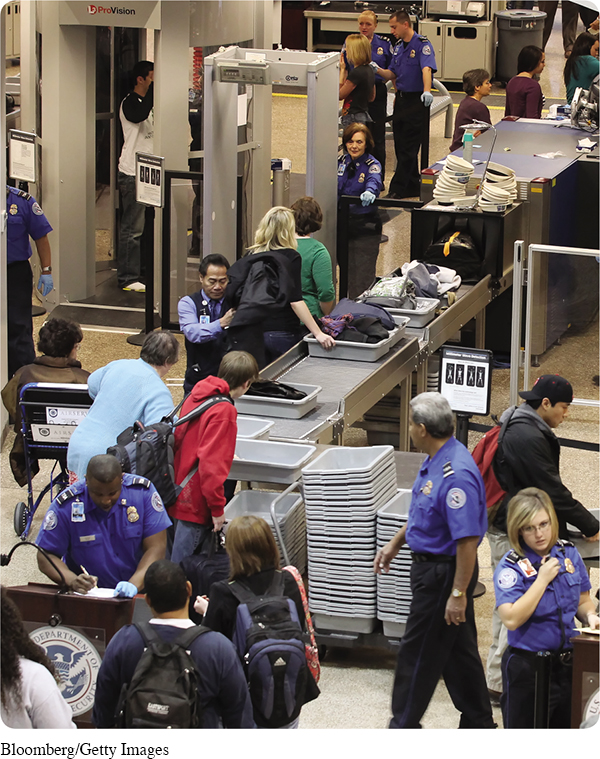Chapter 23: Is America Safer Now Than Before 9/11?
See the additional resources for content and reading quizzes for this chapter.

Bloomberg/Getty Images
In a speech on the tenth anniversary of the September 11, 2001, terrorist attacks, former New York mayor Rudolph W. Giuliani said, “As with Pearl Harbor and the John F. Kennedy assassination, these defining events have a big impact on a nation because they’re not just a shared experience; they’re a shared memory.” There is no doubt that the attacks profoundly affected our country’s policies, politics, economy, society, and even collective psychology. Moreover, in addition to sharing the immediate experience of September 11, Americans have dealt with its consequences in the years since.
In the immediate aftermath of 9/11, the United States heightened security at home while applying military force overseas. In Afghanistan, the United States toppled the ruling Taliban (a regime that provided sanctuary for al-Qaeda) and in 2003 began the politically contentious Iraq war. President George W. Bush set forth the nation’s new challenges in a speech to Congress, saying, “Our war on terror begins with al-Qaeda, but it does not end there. It will not end until every terrorist group of global reach has been found, stopped, and defeated.”
Most Americans have experienced the long-term effects of 9/11 through the actions of new agencies, such as the Transportation Security Administration and the Department of Homeland Security, as well as the provisions of the Patriot Act. For example, Americans have grown accustomed to removing their shoes and submitting to invasive searches at airport security checkpoints. In addition to these relatively obvious responses to the threat of terrorism, a large, complex, expensive, and largely hidden security apparatus has come into being. According to a 2010 Washington Post report, “Some 1,271 government organizations and 1,931 private companies work on programs related to counterterrorism, homeland security, and intelligence in about 10,000 locations across the United States.” All this comes at considerable cost—over $1 trillion since the 9/11 attacks. Given that at least thirty planned terrorist attacks have been thwarted since that time, many argue that the government’s actions are justified. Others worry about excessive—and possibly unconstitutional—infringements of privacy and civil liberties in the name of national security. The basic question, however, still remains: even with all these measures, are Americans really any safer now than they were before 9/11?
The four essays in this casebook evaluate the nation’s long-term responses to the September 11, 2001 attacks. In “Ten Years after 9/11, We’re Still in the Dark,” Omar Ashmawy, a U.S. Air Force veteran, examines America’s approach to interrogating and detaining suspected terrorists, claiming, “After so many years and so much sacrifice, nothing has changed” (para. 1). In “Remembering 9/11: How Safe Are We Today?” Paul Brandus lists the major terrorist attacks that have occurred since 2001 but still asserts that Americans’ level of fear is not really justified. Jonathan Rauch agrees, questioning the extent of our fear and even asserting, in “Be Not Afraid,” “Never have so many feared so little, so much” (para. 13). Finally, in “The TSA Has Never Kept You Safe: Here’s Why,” Christopher Elliott reports on a test of TSA screening that revealed its ineffectiveness but argues that the agency’s purpose was never to keep the United States safe.
